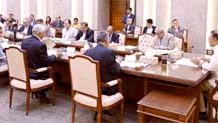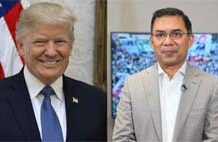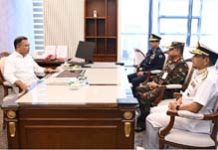C T Online Desk: The bilateral meeting between Bangladesh prime minister Sheikh Hasina and Indian prime minister Narendra Modi on Tuesday once again agreed to work towards bringing the number of ‘deaths due to incidents’ down to zero along the border.
The two leaders also agreed to strengthen cooperation in the power sector and expedite efforts to improve bilateral and sub-regional connectivity.
‘Noting with satisfaction that the number of deaths due to incidents along the border has significantly reduced, both sides agreed to work towards bringing the number down to zero,’ said a joint statement issued on Wednesday during the state visit of Sheikh Hasina to India.
At the meeting with her Indian counterpart, Modi, Hasina led the Bangladesh delegation at the Hyderabad House, a state guest house in India.
‘Recognising that peaceful management of the India-Bangladesh border is a shared priority, the two leaders directed the officials to expedite work to complete all pending developmental works within 150 yards of the zero line, including fencing, starting with the Tripura sector with the objective of maintaining a tranquil and crime-free border,’ the statement mentioned.
It said that both sides noted with appreciation the stepped-up efforts by the two border guarding forces against the smuggling of arms, narcotics, and fake currency and to prevent trafficking, particularly of women and children.
Human rights groups said that incidents of border killings by the Indian Border Security Force have continued over the years despite repeated assurances from the Indian side to bring down the number of such incidents to zero.
Ain o Salish Kendra data showed that the BSF killed at least 18 Bangladeshis along the border with India in 2022.
At least eight Bangladeshis were reportedly killed by the Indian force this year.
As the Bangladesh side requested for a ‘predictable supply of the essential food commodities from India such as rice, wheat, sugar, onion, ginger, and garlic, the Indian side conveyed that Bangladesh’s requests would be favourably considered based on prevalent supply conditions in India, and all efforts would be made in this regard, according to the joint statement.
When the Bangladesh side requested for import of power from Nepal and Bhutan through India, the Indian side informed them that the guidelines for the same were already in place in India.
Noting with satisfaction the convening of the 38th Ministerial Meeting of the Joint Rivers Commission of India and Bangladesh on August 25 in New Delhi, the two leaders welcomed the signing of an MoU between the Ministry of Jal Shakti, India and the Ministry of Water Resources, on the Withdrawal of Water by India and Bangladesh from the Common Border River Kushiyara, which will, as mentioned in the statement, help Bangladesh address its irrigation needs and facilitate water projects for South Assam.
The Indian side requested for early signing of the interim water sharing agreement on the Feni River, taking into account the urgent irrigation requirements of Tripura, the statement said, adding that the Bangladesh side took note of the Indian request.
The Indian side thanked Bangladesh for enabling India to construct the intake well to implement the 2019 MoU between the two countries on the withdrawal of 1.82 cusecs of water from the Feni river for drinking water supply for Sabroom town in Tripura.
The two premiers welcomed the formation of a Joint Technical Committee to conduct a study for the optimum utilisation of water received by Bangladesh under the provisions of the Ganges Water Sharing Treaty, 1996.
The bilateral talks, however, ended without any concrete outcome on outstanding issues like the Teesta water-sharing deal, which has been kept pending by the Indian side for over a decade.
‘Recalling earlier discussions, prime minister Sheikh Hasina reiterated Bangladesh’s long-pending request for concluding the interim agreement on the sharing of the waters of the Teesta River, the draft of which was finalised in 2011,’ said the statement.
The two prime ministers also agreed to collaborate in new areas of cooperation, such as environment, climate change, cyber security, ICT, space technology, green energy and blue economy.
In response to Bangladesh’s request to assist in meeting its domestic requirement for petroleum products, the Indian side agreed to facilitate discussions between the authorised agencies of both sides.
The Indian side appreciated Bangladesh’s timely support in allowing the transportation of petroleum, oil and lubricants from Assam to Tripura via Bangladesh in the light of disruptions due to the devastating floods in Assam and Meghalaya.
The Indian side requested Bangladesh to complete the remaining infrastructure, immigration, and customs facilities for the operationalisation of the Maitri Bridge over the River Feni, connecting Tripura with Bangladesh, at an early date.
Bangladesh reiterated its eagerness to partner in the ongoing initiative of the India-Myanmar-Thailand trilateral highway project as the two leaders agreed to expedite efforts to improve bilateral and sub-regional connectivity through the early operationalisation of the BBIN [Bangladesh, Bhutan, India, and Nepal] Motor Vehicle Agreement.
The Bangladesh side also requested rail connectivity with Bhutan through the newly inaugurated Chilahati–Haldibari route. The Indian side agreed to consider the request, based on its viability and feasibility, the statement mentioned.
The two leaders welcomed the recent finalisation of a Joint Feasibility Study, which recommended that a Comprehensive Economic Partnership Agreement would be beneficial for both countries. They directed trade officials on both sides to start negotiations within the calendar year 2022 and to complete these at the earliest, in time for Bangladesh’s final graduation from LDC status.
Dhaka and New Delhi on Tuesday signed seven memorandums of understanding on the second day of the Bangladesh prime minister’s four-day state visit to India at the invitation of her Indian counterpart.
She is scheduled to return to Dhaka on September 8.
Her programme this time also includes the launching of the ‘Bangabandhu Sheikh Mujibur Rahman Student Scholarship’ for 200 descendants of Indian Armed Forces personnel martyred and critically injured during Bangladesh’s War of Independence in 1971.
She also addressed a business event, jointly organised by the Indian and Bangladesh business communities on September 7, 2022.
The Bangladesh prime minister last visited India in 2019 before the Covid pandemic broke out.















